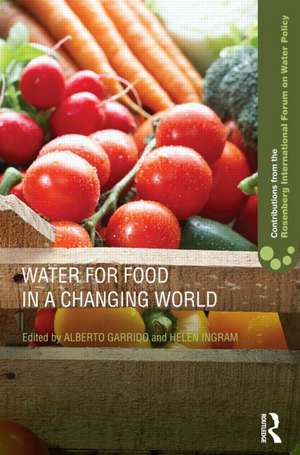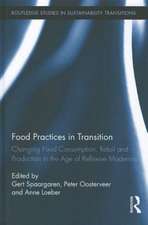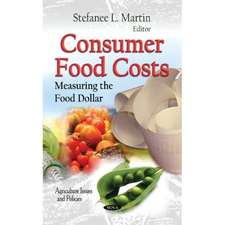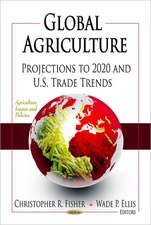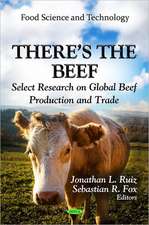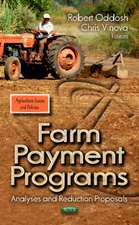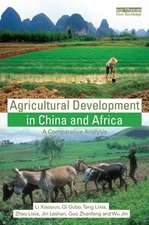Water for Food in a Changing World: Contributions from the Rosenberg International Forum on Water Policy
Editat de Alberto Garrido, Helen Ingramen Limba Engleză Hardback – 6 apr 2011
Irrigation productivity rose dramatically over the past 40 years as a result of the Green Revolution. However, even if we disregard the environmental impacts caused by that revolution, we are no nearer to achieving global food security than we were 40 years ago, as every time we come close to filling the food production gap population growth and ecosystem decline associated with water diversions to human purposes set us back. Our natural and agricultural ecosystems are trying to tell us something.
This book pursues these overarching themes connecting to water and food production at global and regional scales. The collection offers a comprehensive discussion of all relevant issues, and offers a wide-ranging discussion with the aim of contributing to the global debate about water and food crises.
Preț: 826.32 lei
Preț vechi: 1106.55 lei
-25% Nou
Puncte Express: 1239
Preț estimativ în valută:
158.14€ • 164.49$ • 130.55£
158.14€ • 164.49$ • 130.55£
Carte tipărită la comandă
Livrare economică 14-28 aprilie
Preluare comenzi: 021 569.72.76
Specificații
ISBN-13: 9780415619110
ISBN-10: 0415619114
Pagini: 352
Ilustrații: 65 b/w images, 24 tables and 65 line drawings
Dimensiuni: 156 x 234 x 25 mm
Greutate: 0.81 kg
Ediția:New.
Editura: Taylor & Francis
Colecția Routledge
Seria Contributions from the Rosenberg International Forum on Water Policy
Locul publicării:Oxford, United Kingdom
ISBN-10: 0415619114
Pagini: 352
Ilustrații: 65 b/w images, 24 tables and 65 line drawings
Dimensiuni: 156 x 234 x 25 mm
Greutate: 0.81 kg
Ediția:New.
Editura: Taylor & Francis
Colecția Routledge
Seria Contributions from the Rosenberg International Forum on Water Policy
Locul publicării:Oxford, United Kingdom
Public țintă
Postgraduate and UndergraduateCuprins
Preface Part 1: Introduction 1. Water for Food in a Changing World Part 2: Innovations in Agricultural Response to Sustainability Challenge 2. Optimising Water Productivity in Food Production 3. Modern Agricultural under Stress: Lessons from the Murray Darling in Australia 4. Integrated Watershed Management 5. Lessons from Spain: a Critical of Assessment of the Role of Science and Society Part 3: Counting the drops and the mouths to feed: Food Production and Trade 6. Integrating Agricultural Water Use with the Global Water Budget 7. Globalisation of Water through Virtual Water Trade Part 4: Water for the environment 8. Balancing Water for people and nature 9. Optimising Water for Life Part 5: Revitalized Water Governance 10. Water Science and Policy in a Changing World: Implications of Non-Stationary Hydrology, Ecolomics and Politics 11. Promises Under Construction: The Evolving Paradigm for Water Governance and the Case of Northern Mexico 12. Beyond Universal Remedies for Good Water Governance: A Political and Contextual Approach 13. Water Policies in Spain: Balancing Water for Food and Water for Nature Part 6: Conclusions 14. Can the World Feed itself Sustainably?
Notă biografică
Alberto Garrido is Professor of Agricultural and Resource Economics at the Technical University of Madrid, Spain. He is the Director of the Research Centre for the Management of Agricultural and Environmental Risks, a research centre of the Technical University of Madrid, and serves in the Advisory Committee of the Rosenberg International Forum of Water Policy.
Helen Ingram is a Professor Emerita at the University of California, USA, and a research fellow at the Southwest Center at the University of Arizona, USA. She is also a member of the Advisory Committee of the Rosenberg International Water Forum.
Helen Ingram is a Professor Emerita at the University of California, USA, and a research fellow at the Southwest Center at the University of Arizona, USA. She is also a member of the Advisory Committee of the Rosenberg International Water Forum.
Descriere
Our thirst for water grows with our population, but the amount of fresh water available on Earth is fixed. If we assume "business as usual" by 2050 about forty per cent of the projected global population of nine point four billion is expected to be facing water stress or scarcity. This book explores water and food production at global and regional scales. The collection offers a comprehensive discussion of all relevant issues, and offers a wide-ranging discussion with the aim of contributing to the global debate about water and food crises.
